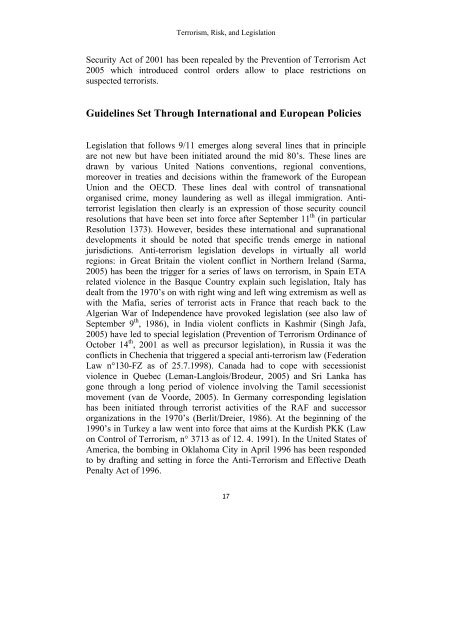222467to222472
222467to222472
222467to222472
Create successful ePaper yourself
Turn your PDF publications into a flip-book with our unique Google optimized e-Paper software.
Terrorism, Risk, and Legislation<br />
Security Act of 2001 has been repealed by the Prevention of Terrorism Act<br />
2005 which introduced control orders allow to place restrictions on<br />
suspected terrorists.<br />
Guidelines Set Through International and European Policies<br />
Legislation that follows 9/11 emerges along several lines that in principle<br />
are not new but have been initiated around the mid 80’s. These lines are<br />
drawn by various United Nations conventions, regional conventions,<br />
moreover in treaties and decisions within the framework of the European<br />
Union and the OECD. These lines deal with control of transnational<br />
organised crime, money laundering as well as illegal immigration. Antiterrorist<br />
legislation then clearly is an expression of those security council<br />
resolutions that have been set into force after September 11 th (in particular<br />
Resolution 1373). However, besides these international and supranational<br />
developments it should be noted that specific trends emerge in national<br />
jurisdictions. Anti-terrorism legislation develops in virtually all world<br />
regions: in Great Britain the violent conflict in Northern Ireland (Sarma,<br />
2005) has been the trigger for a series of laws on terrorism, in Spain ETA<br />
related violence in the Basque Country explain such legislation, Italy has<br />
dealt from the 1970’s on with right wing and left wing extremism as well as<br />
with the Mafia, series of terrorist acts in France that reach back to the<br />
Algerian War of Independence have provoked legislation (see also law of<br />
September 9 th , 1986), in India violent conflicts in Kashmir (Singh Jafa,<br />
2005) have led to special legislation (Prevention of Terrorism Ordinance of<br />
October 14 th , 2001 as well as precursor legislation), in Russia it was the<br />
conflicts in Chechenia that triggered a special anti-terrorism law (Federation<br />
Law n°130-FZ as of 25.7.1998). Canada had to cope with secessionist<br />
violence in Quebec (Leman-Langlois/Brodeur, 2005) and Sri Lanka has<br />
gone through a long period of violence involving the Tamil secessionist<br />
movement (van de Voorde, 2005). In Germany corresponding legislation<br />
has been initiated through terrorist activities of the RAF and successor<br />
organizations in the 1970’s (Berlit/Dreier, 1986). At the beginning of the<br />
1990’s in Turkey a law went into force that aims at the Kurdish PKK (Law<br />
on Control of Terrorism, n° 3713 as of 12. 4. 1991). In the United States of<br />
America, the bombing in Oklahoma City in April 1996 has been responded<br />
to by drafting and setting in force the Anti-Terrorism and Effective Death<br />
Penalty Act of 1996.<br />
17


